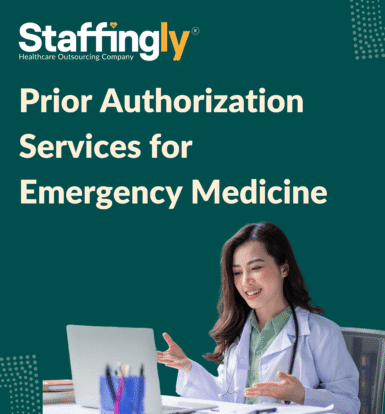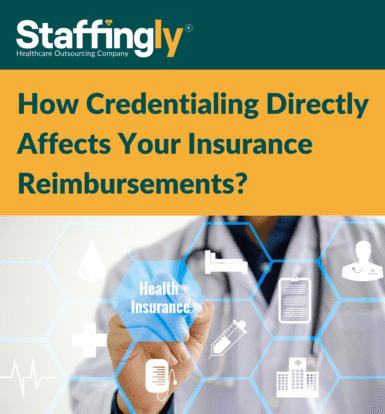On-Demand Outsourcing BPO Services for Healthcare Providers With 24/7 Coverage!
Save up to 70% on staffing costs!
Browse Specialty Staffing Services
Prior Authorization Services for Emergency Medicine
Emergency medicine requires swift decisions and immediate care, but HIPAA prior authorization in emergency medicine can sometimes slow the process down. These insurance approvals are essential to control costs and ensure appropriate treatment while maintaining strict HIPAA compliance, but they often create delays that affect patient outcomes and hospital efficiency. Prior authorization services designed specifically for HIPAA prior authorization in emergency medicine help navigate these challenges by speeding up approvals, reducing claim denials, and maintaining regulatory compliance—so providers can focus

What Are the HIPAA Compliance Challenges for Medical Scribing in Delaware?
Medical scribing is becoming increasingly common as a way to improve healthcare documentation efficiency. In Delaware, as in many states, medical scribes help providers capture patient information in real time, allowing clinicians to focus more on patient care. However, the sensitive nature of medical records means scribes must operate under strict HIPAA (Health Insurance Portability and Accountability Act) regulations. Ensuring HIPAA compliance in medical scribing presents unique challenges for practices in Delaware, impacting data security, patient privacy, and legal liability.

What Are the Perks of Outsourcing Prior Authorization Services?
Prior authorization is a critical step required by many insurance companies before certain medical treatments or procedures are approved for payment. While necessary, the process can be cumbersome, time-consuming, and costly for healthcare providers. Outsourcing prior authorization services has emerged as an effective strategy to reduce administrative burdens, improve efficiency, and enhance patient care. This article explores the benefits of outsourcing prior authorization and how it supports better healthcare practice management. Key Takeaways Prior authorization is essential but can be

How Credentialing Directly Affects Your Insurance Reimbursements?
Behind the scenes of every healthcare practice is a complex system that keeps things running smoothly—one essential piece being how credentialing impacts insurance reimbursements. While often overlooked as just verifying a provider’s qualifications, credentialing plays a vital role in ensuring timely insurance reimbursements. By 2025, efficient credentialing is not only legally required but also a critical factor in a practice’s financial health. Without it, providers can’t get paid, making credentialing a foundational part of any revenue cycle. Key Takeaways Credentialing

What Are the Key HIPAA Regulations for Insurance Verification in New Jersey?
Insurance verification is an essential part of healthcare, confirming patients’ coverage before services are provided. In New Jersey, providers must follow HIPAA regulations closely during this process to protect sensitive patient information. Understanding the key HIPAA rules helps healthcare staff maintain compliance while ensuring smooth, secure verification workflows. This article highlights the most important HIPAA requirements for insurance verification in New Jersey and offers practical guidance for providers. Key Takeaways HIPAA protects patient health information during insurance verification. New Jersey

How to Handle Prior Authorization Delays Without Losing Patients?
Prior authorization (PA) is a crucial but often frustrating step in healthcare, requiring approval from insurance companies before certain treatments or medications can proceed. While intended to control costs and ensure appropriate care, handling prior authorization delays effectively is essential because PA delays frequently disrupt patient care, frustrate providers, and risk losing patient trust. This article explores practical strategies to manage prior authorization delays effectively—helping healthcare providers reduce wait times, improve communication, and maintain patient satisfaction despite these challenges. Key

How Does HIPAA Affect Prior Authorization Workflows in Maryland Healthcare?
Prior authorization (PA) is a crucial step in healthcare that helps control costs and ensures patients receive the right treatments. However, managing PA can be complicated—especially when healthcare providers must also comply with HIPAA impact on prior authorization Maryland, the federal law that protects patient privacy combined with state-specific regulations. In Maryland, where state laws add another layer of privacy requirements, healthcare providers face unique challenges in balancing efficiency and compliance. Key Takeaways HIPAA requires strict protection of patient information

Why Are HIPAA-Compliant Medical Credentialing Services Essential for Neonatologists?
When it comes to caring for the tiniest and most vulnerable patients, neonatologists carry a profound responsibility. But their specialized expertise in newborn care isn’t the only demand of the profession — navigating the maze of medical credentialing is just as critical. Credentialing ensures that neonatologists meet the required standards to deliver care in hospitals, NICUs, and through insurance networks. However, the complexity of the process — spanning licensure, hospital privileges, payer enrollment, and regulatory compliance — can quickly overwhelm
 Book a Demo to Build Your Team Today!
Book a Demo to Build Your Team Today!


 Read Case Studies
Read Case Studies 



 Virtual Medical Assistants
Virtual Medical Assistants



